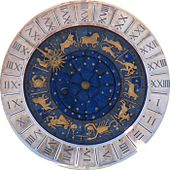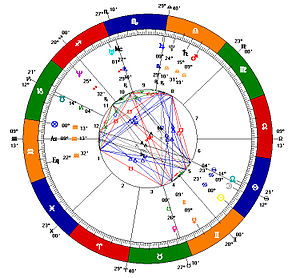
Back Horoskoop Afrikaans طالع الأبراج Arabic Qoroskop Azerbaijani Гараскоп Byelorussian Хороскоп Bulgarian कुंडली Bihari রাশিফল Bengali/Bangla Horoskop BS Horòscop Catalan Horoskop Czech
This article needs additional citations for verification. (July 2011) |
| Astrology |
|---|
 |
| Background |
| Traditions |
| Branches |
| Astrological signs |
| Symbols |

A horoscope (or other commonly used names for the horoscope in English include natal chart, astrological chart, astro-chart, celestial map, sky-map, star-chart, cosmogram, vitasphere, radical chart, radix, chart wheel or simply chart) is an astrological chart or diagram representing the positions of the Sun, Moon, planets, astrological aspects and sensitive angles at the time of an event, such as the moment of a person's birth. The word horoscope is derived from the Greek words ōra and scopos meaning "time" and "observer" (horoskopos, pl. horoskopoi, or "marker(s) of the hour"). It is claimed by proponents of astrology that a horoscope can be used as a method of divination regarding events relating to the point in time it represents, and it forms the basis of the horoscopic traditions of astrology, although practices surrounding astrology have been recognized as pseudoscientific since the 18th century.[1] Horoscope columns are often featured in print and online newspapers.[2]
In common usage, horoscope often refers to an astrologer's interpretation, usually based on a system of solar Sun sign astrology; based strictly on the position of the Sun at the time of birth, or on the calendar significance of an event, as in Chinese astrology. In particular, many newspapers and magazines carry predictive columns, written in prose that may be written more for increasing readership than tied directly to the Sun or other aspects of the Solar System, allegedly based on celestial influences in relation to the zodiacal placement of the Sun on the month of birth, cusp (two days before or after any particular sign, an overlap), or decant (the month divided into three ten-day periods) of the person's month of birth, identifying the individual's Sun sign or "star sign" based on the tropical zodiac.[3]
In Hindu astrology, birth charts are called kundali which are claimed to be based on movement of stars and Moon. Auspicious events and rituals are started after checking the kundali of a person including the marriage in which the birth charts of the boy and girl are matched.
There are no scientific studies that have shown support for the accuracy of horoscopes, and the methods used to make interpretations are considered to be examples of pseudoscience.[4][5][6][7][8]: 1350 In modern scientific framework no known interaction exists that could be responsible for the transmission of the alleged influence between a person and the position of stars in the sky at the moment of birth.[9][10] In all tests completed, keeping strict methods to include a control group and proper blinding between experimenters and subjects, horoscopes have shown no effect beyond pure chance.[11][12][13] Furthermore, some psychological tests have shown that it is possible to construct personality descriptions and foretelling generic enough to satisfy most members of a large audience simultaneously, referred to as the Forer or Barnum effect.
- ^
- Hanegraaff, Wouter J. (2012). Esotericism and the Academy: Rejected Knowledge in Western Culture. Cambridge: Cambridge University Press. p. 171. ISBN 978-0-521-19621-5. Archived from the original on 2023-01-26. Retrieved 2023-01-26.
- Long, H. S. (2003). "Astrology". In Carson, Thomas; Cerrito, Joann (eds.). New Catholic Encyclopedia. Vol. 1 (2nd ed.). Thomson/Gale. pp. 811–813. ISBN 0-7876-4005-0. p. 811.
- Thagard 1978, p. 229.
- ^ Gourarie, Chava (2016-03-03). "Why are horoscopes and media a match?". Columbia Journalism Review. Archived from the original on 2022-12-06. Retrieved 2022-04-11.
- ^ "How Horoscopes Work". 29 January 2005. Archived from the original on 6 May 2009. Retrieved 27 February 2008.
- ^ Thagard, Paul R. (1978). "Why Astrology is a Pseudoscience" (PDF). Proceedings of the Biennial Meeting of the Philosophy of Science Association. 1 (1). The University of Chicago Press: 223–234. doi:10.1086/psaprocbienmeetp.1978.1.192639. JSTOR 192639. S2CID 147050929. Archived (PDF) from the original on 2022-10-09.
- ^ "Astrology". Encyclopædia Britannica. Archived from the original on 2015-05-08. Retrieved 2022-06-23.
- ^ Sven Ove Hansson; Edward N. Zalta. "Science and Pseudo-Science". Stanford Encyclopedia of Philosophy. Retrieved 6 July 2012.
- ^ "Astronomical Pseudo-Science: A Skeptic's Resource List". Astronomical Society of the Pacific. Archived from the original on 2011-12-30. Retrieved 2015-12-06.
- ^ Hartmann, P.; Reuter, M.; Nyborga, H. (May 2006). "The relationship between date of birth and individual differences in personality and general intelligence: A large-scale study". Personality and Individual Differences. 40 (7): 1349–1362. doi:10.1016/j.paid.2005.11.017.
To optimise the chances of finding even remote relationships between date of birth and individual differences in personality and intelligence we further applied two different strategies. The first one was based on the common chronological concept of time (e.g. month of birth and season of birth). The second strategy was based on the (pseudo-scientific) concept of astrology (e.g. Sun Signs, The Elements, and astrological gender), as discussed in the book Astrology: Science or superstition? by Eysenck and Nias (1982).
- ^ Asquith, Peter D., ed. (1978). Proceedings of the Biennial Meeting of the Philosophy of Science Association, vol. 1. Dordrecht u.a.: Reidel u.a. ISBN 978-0-917586-05-7. Archived from the original on 2022-04-24. Retrieved 2015-12-06.
- ^ Bappu, M. K. V.; S. K. Biswas; D. C. V. Mallik; C. V. Vishveshwara, eds. (1989). Cosmic Perspectives: Essays Dedicated to the Memory of M.K.V. Bappu (1st ed.). Cambridge: Cambridge University Press. ISBN 0-521-34354-2. OCLC 18519928.
- ^ Carlson, Shawn (1985). "A double-blind test of astrology" (PDF). Nature. 318 (6045): 419–425. Bibcode:1985Natur.318..419C. doi:10.1038/318419a0. S2CID 5135208. Archived (PDF) from the original on 2022-10-09.
- ^ Zarka, Philippe (2011). "Astronomy and astrology". Proceedings of the International Astronomical Union. 5 (S260): 420–425. Bibcode:2011IAUS..260..420Z. doi:10.1017/S1743921311002602. Archived from the original on 2020-08-18. Retrieved 2019-09-12.
- ^
- Assem, L. van (1993). The astrologer’s philosophy of life. Correlation, 12(1), p.52-54.
- Cornelius, G. (1994). The Moment of Astrology. Penguin Books, Arkana.
- Dean, G. (1985). Can astrology predict E and N? Correlation, 5(2), p.2-24.
- Dean, G. (1987). Does astrology need to be true? Skeptical Inquirer, 11(2), p.166-184.
- Dean, G. & Mather, A. (1994). Is the scientific approach relevant to astrology? Correlation, 13(1), p.11-18.
- Nienhuys, J.W. (1991). Astrologie faalt in Indiana. Skepter, 4(2), p.26-27.
© MMXXIII Rich X Search. We shall prevail. All rights reserved. Rich X Search